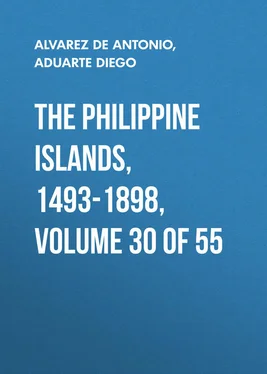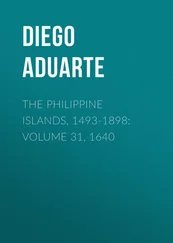Antonio Alvarez de Abreu - The Philippine Islands, 1493-1898, Volume 30 of 55
Здесь есть возможность читать онлайн «Antonio Alvarez de Abreu - The Philippine Islands, 1493-1898, Volume 30 of 55» — ознакомительный отрывок электронной книги совершенно бесплатно, а после прочтения отрывка купить полную версию. В некоторых случаях можно слушать аудио, скачать через торрент в формате fb2 и присутствует краткое содержание. Жанр: foreign_antique, foreign_prose, Историческая проза, на английском языке. Описание произведения, (предисловие) а так же отзывы посетителей доступны на портале библиотеки ЛибКат.
- Название:The Philippine Islands, 1493-1898, Volume 30 of 55
- Автор:
- Жанр:
- Год:неизвестен
- ISBN:нет данных
- Рейтинг книги:4 / 5. Голосов: 1
-
Избранное:Добавить в избранное
- Отзывы:
-
Ваша оценка:
- 80
- 1
- 2
- 3
- 4
- 5
The Philippine Islands, 1493-1898, Volume 30 of 55: краткое содержание, описание и аннотация
Предлагаем к чтению аннотацию, описание, краткое содержание или предисловие (зависит от того, что написал сам автор книги «The Philippine Islands, 1493-1898, Volume 30 of 55»). Если вы не нашли необходимую информацию о книге — напишите в комментариях, мы постараемся отыскать её.
The Philippine Islands, 1493-1898, Volume 30 of 55 — читать онлайн ознакомительный отрывок
Ниже представлен текст книги, разбитый по страницам. Система сохранения места последней прочитанной страницы, позволяет с удобством читать онлайн бесплатно книгу «The Philippine Islands, 1493-1898, Volume 30 of 55», без необходимости каждый раз заново искать на чём Вы остановились. Поставьте закладку, и сможете в любой момент перейти на страницу, на которой закончили чтение.
Интервал:
Закладка:
There remains, then, the third point of the three that I have stated; that is, the form which must be adopted and followed in this commerce of the islands with Nueva España. Don Pedro de Quiroga proceeded in this matter with measures so rigorous and unusual that he tried to establish regulations different from those which are respected and observed in all the ports of España, of the Indias, and of the world. He undertook to open and weigh the bundles and chests, and to count, weigh, and measure the commodities and wares, without any preceding denunciation, information, or [even] indication that these exceeded the registration. He laid an embargo on all, without there being any guilt on the part of the owners, or prohibition of the articles; and for only raising this so unjust embargo he extorted from the commerce 300,000 pesos – excluding from composition 600,000 pesos’ worth besides, which are included in the [right of] composition by express, clear, and plain provisos [of the ordinances]. He collected the dues on whatever appraisement of the goods it suited him to make, although it was evident to him that they were being sold at half that rate in Acapulco, and even in Mexico. He hindered the return of the proceeds from the merchandise, which is allowed by the royal decree; and it cannot be denied that he who carries his goods to sell, [even though] with permission, may not exact the price that he shall obtain for them. For granting that permission, he demanded new dues and imposed new burdens; compelled the shippers to do whatever he wished, and harassed the mariners on that trade-route until he made them leave it – when it is known (and the islands are making representations to that effect) that it is for what is most needed in those islands that the governors in Manila make concessions to their citizens when the latter ask for these, in order to constrain them by kindness to what could not be obtained by severity; and the Council is conferring upon those citizens privileges and distinctions, in order that many may be encouraged to become mariners and artillerists. All this was done by Don Pedro de Quiroga under pretext of serving his Majesty; but it caused his royal exchequer the great loss which has been experienced in the failure, for two years, of ships to arrive from Philipinas. By this has been lost, in dues alone, 660,000 pesos, and as much more through the suspension of commerce; and still greater were the losses to the vassals of his Majesty, to say nothing of the danger in which those islands were left, and to which they are still exposed. To speak of the plan which should be established in this commerce, it seems as if it were sufficient to place before your illustrious Lordship what Don Pedro de Quiroga did, and what resulted from that, in order to understand that if by his proceedings he destroyed and ruined the commerce it is not expedient to follow his example. Rather should be followed those of Sevilla, Cartagena, Portovelo, Vera Cruz, and the other ports of the Indias and of these kingdoms, in which royal laws, decrees, and ordinances have ordained what shall be observed in these matters; and since these regulations are not annulled or broken in favor of the islands, it will not be just if they are broken or annulled to the loss or injury of that colony. For neither do those vassals merit less than this, nor is their commerce of different character from the other commerce that belongs to this crown.
Although representations have been made, with more exaggeration and less in accordance [with the facts] than would be desirable, of serious infractions of law that have been committed in this commerce – which representations I have answered at length and in detail in the said memorial, from no. 94 to no. 99 – it may be observed that, if there are any (which, if I do not admit, I do not deny), they are not of greater extent nor of different character than those which are every year experienced in the fleets and galleons on the India trade-route. These infractions consist in shipping more merchandise than what is registered, and different commodities from what are declared, and in carrying back more silver than is shown by the registers; and there are not and cannot be on the ships of Philipinas other infractions than the shipment of more goods and the return of more silver than appear on the registers. Let, then, the remedy be ascertained which is applied at Sevilla, Cadiz, and San Lucar, at Cartagena, Portovelo, Vera Cruz, and Habana, and let the same be applied at Manila and Acapulco. 7 7 Raynal thus describes Acapulco, in his History of Settlements and Trade in Indies (Justamond’s translation, London, 1783), iii, pp. 378, 379: “The port of Acapulco where the vessel arrives, hath two inlets, separated from each other by a small island: the entrance into them in the day is by means of a sea-breeze, and the sailing out in the night-time is effected by a land-breeze. It is defended only by a bad fort, fifty soldiers, forty-two pieces of cannon, and thirty-two of the corps of artillery. It is equally extensive, safe, and commodious. The bason which forms this beautiful harbor is surrounded by lofty mountains, which are so dry, that they are even destitute of water. Four hundred families of Chinese, Mulattoes, and Negroes, which compose three companies of militia, are the only persons accustomed to breathe the air of this place, which is burning, heavy, and unwholesome. The number of inhabitants in this feeble and miserable colony is considerably increased upon the arrival of the galleons, by the merchants from all the provinces of Mexico, who come to exchange their silver and their cochineal, for the spices, muslins, china, printed linens, silks, perfumes, and gold works of Asia. At this market, the fraud impudently begun in the Old World, is as impudently completed in the New. The statutes have limited the sale to 2,700,000 livres, and it exceeds 10,800,000 livres. All the money produced by these exchanges should give ten per cent. to the government: but they are deprived of three-fourths of the revenue which they ought to collect from their customs, by false entries.” This passage is appropriated bodily – with a few changes, and an important omission – in Malo de Luque’s Establecimientos ultramarinos (Madrid, 1790), v, p. 220; and no credit is given by him to Raynal. On the map of Acapulco in Bellin’s Atlas maritime (Paris, 1764), t. ii, p. 86, appears the following naïve item in the legend at the side: “Two trees, to which the galleon from Manila attaches a cable;” these trees are located directly in front of the tiny “city,” and between two redoubts.
Let guards be placed, and informers allowed, and goods declared – with rewards to encourage, and punishments to warn; but it would be a chance success to ascertain in detail what would be shipped at Sevilla and unloaded in the ports of the Indias. This would be to establish not order but disorder in that commerce, as I state in the said memorial, no. 95; and soon the same thing would be noticed in that of the islands.
And although it may be represented that the infractions in the Philipinas trade, considering their amount, cause more loss than those in the commerce of España, especially in the exportation of the silver – since that which is brought in the galleons outside of the kingdom finally comes to Castilla; and that which is carried in the ships of Philipinas soon finds its way to China, and thus is lost, and the commerce is taken away from the vassals of this crown – reply may thus be made. The illegal shipments on the Philipinas route cause much less loss than do those on the India route, as is incurred when a galleon laden with silver is lost at sea, as compared with one that is captured by enemies; in the former case there is only our own loss, but in the latter is the same loss, and an advantage to our enemies. It cannot be denied that the silver which goes unregistered in the ships of Philipinas is lost, but no enemy of this crown benefits thereby; for that silver comes to a halt in China, from which country it never emerges – as is stated in the said memorial, no. 72 – nor does it work any harm there, whether it be more or less; for neither do we wage war with China, nor do the Chinese aid any other nation which wages war with us. As for the silver which comes [to España] unregistered in the galleons, those who best understand the subject consider that it would cause less damage if it remained in the Indias (and even some extend this idea to its being lost in the sea); because, under the pretext of its coming concealed, it either does not come into Sevilla, or, if it does come in, soon goes out again. In both these cases, it remains in the hands of the French, English, Flemish, and Portuguese, and most of it is anchored in their ships, by which Inglaterra, Francia, and Holanda are enriched; while that which goes to Portugal is carried to India, and there it is shared by the Dutch, Persians, Arabs, Mogous, and other hostile nations, until it reaches China, which is its center [of equilibrium]. It may be judged, then, which is the greater injury; and since the loss caused by the illegal shipments on the vessels of Philipinas is less, let that be done with those ships that is done with the galleons. But let it not be proposed that the commerce be taken from them, or its amount limited, or that unusual methods and severity be employed in dealing with them, since these are not used in the commerce of the Indias, and, comparing them together, one is no less necessary than the other.
Читать дальшеИнтервал:
Закладка:
Похожие книги на «The Philippine Islands, 1493-1898, Volume 30 of 55»
Представляем Вашему вниманию похожие книги на «The Philippine Islands, 1493-1898, Volume 30 of 55» списком для выбора. Мы отобрали схожую по названию и смыслу литературу в надежде предоставить читателям больше вариантов отыскать новые, интересные, ещё непрочитанные произведения.
Обсуждение, отзывы о книге «The Philippine Islands, 1493-1898, Volume 30 of 55» и просто собственные мнения читателей. Оставьте ваши комментарии, напишите, что Вы думаете о произведении, его смысле или главных героях. Укажите что конкретно понравилось, а что нет, и почему Вы так считаете.












